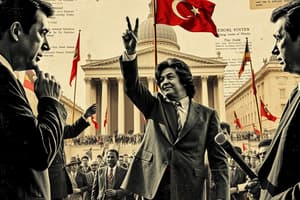Podcast
Questions and Answers
Explain the difference between a presidential system and a parliamentary system. Provide an example of each.
Explain the difference between a presidential system and a parliamentary system. Provide an example of each.
In a presidential system, the executive branch is separate from the legislative branch, with the president being elected independently. For example, Mexico and Nigeria have presidential systems. In a parliamentary system, the executive branch is selected by the legislative branch. For example, the United Kingdom has a parliamentary system.
Describe the concept of judicial independence and explain why it is essential for a democracy.
Describe the concept of judicial independence and explain why it is essential for a democracy.
Judicial independence refers to the principle that courts should not be subject to undue influence from other branches of government or from private or partisan groups. This is crucial for democracy because it ensures that the judiciary can fairly and impartially enforce the law, protect civil rights, and hold officials accountable.
What is the difference between a single-member district (FPTP) electoral system and a proportional representation electoral system? Provide an example of each.
What is the difference between a single-member district (FPTP) electoral system and a proportional representation electoral system? Provide an example of each.
In a single-member district (FPTP) system, the candidate with the most votes in a district wins the seat. For example, the UK uses this system. In a proportional representation (PR) system, parties are awarded seats in a legislature based on their share of the vote. For example, Mexico and Russia have some form of PR systems.
Explain the difference between a coup and a revolution. Give an example of each.
Explain the difference between a coup and a revolution. Give an example of each.
What is civil society? Explain why civil society is important for a democracy.
What is civil society? Explain why civil society is important for a democracy.
What distinguishes a developed country from a developing country?
What distinguishes a developed country from a developing country?
How does the concept of legitimacy affect a political regime?
How does the concept of legitimacy affect a political regime?
Define democratization and its significance in political science.
Define democratization and its significance in political science.
What is the difference between correlation and causation in political science research?
What is the difference between correlation and causation in political science research?
What role does the Gini Index play in measuring a country's economic condition?
What role does the Gini Index play in measuring a country's economic condition?
Flashcards
State
State
A political system that has sovereignty over a population in a defined territory, including being independent; based on the recognized right to self-determination with legitimacy.
Nation
Nation
A group of people with a psychological sense of identity based upon cultural, geographic, or linguistic ties.
HDI (Human Development Index)
HDI (Human Development Index)
A measure of a country's standard of living, including health and education.
Gini Index
Gini Index
Signup and view all the flashcards
Authoritarian Regime
Authoritarian Regime
Signup and view all the flashcards
Federal System
Federal System
Signup and view all the flashcards
Devolution
Devolution
Signup and view all the flashcards
Parliamentary System
Parliamentary System
Signup and view all the flashcards
Presidential System
Presidential System
Signup and view all the flashcards
Cabinet
Cabinet
Signup and view all the flashcards
Study Notes
Freedom House
- Independent watchdog organization focused on global freedom and democracy
- Measures freedom by political rights and civil liberties
- Categorizes countries as Not Free, Partly Free, or Free
Normative vs. Empirical
- Normative: Making comparisons/classifications based on philosophies, norms or "should" statements
- Empirical: Drawing conclusions based on facts, rather than opinions or observations; used by political scientists
Correlation
- Association between two or more variables, often seen in political systems
- Example: Economic liberalization correlating with political liberalization
Country Classifications
- Developed/Industrialized/Consolidated Democracies: High per capita GDP, well-developed infrastructure, healthcare, and education
- Developing Countries: Rapid economic growth, but low per capita GDP, infrastructure and educational weaknesses
- HDI: Measures standard of living, including health and education
- Gini Index: Measures economic inequality
State, Nation, Government, Regime
- State: Political system with sovereignty over a population and territory; independent and legitimate
- Nation: Group with psychological sense of identity based on culture, geography, or language
- Government: Political leadership; more fluid than regime
- Regime: Permanent norms of political power distribution and use; more enduring than government
Legitimacy, Democratic, Authoritarian, Theocracy
- Legitimacy: Degree of public acceptance of the regime (by law, charisma, or tradition)
- Democratic: Adheres to rule of law, free elections, independent institutions, competition, and open civil society
- Authoritarian: Restricts civil liberties, uses law and institutions to maintain power, limits civil society, disregards human rights
- Theocracy: Maintains religious laws, with religious courts interpreting all laws
Democratization, Coup, Revolution, Devolution
- Democratization: Non-democratic states transitioning to governments allowing free and fair elections
- Coup: Attempting to remove government officials by a small group, often military
- Revolution: Overthrowing a regime with broad popular support
- Devolution: Decentralization of power from a central government
Political Systems
- Federal: Power shared between national and regional/state governments
- Unitary: All power held by the central government
- Parliamentary: The legislative branch elects the chief executive (head of government)
- Presidential: The chief executive (head of government and state) is elected independently of the legislature
- Head of State: Symbolic leader, conducts ceremonial duties
- Head of Government: Runs the government, makes daily decisions
Legislatures
- Bicameral: Two-house legislature
- Unicameral: One-house legislature
- Vote of Confidence: Removing a prime minister/cabinet in a parliamentary system
- Impeachment: Removing an executive in a presidential system
Judiciary
- Judicial Independence: Courts are free from improper influence
- Rule of Law: Operating predictably under known and transparent rules
- Rule by Law: Using law unfairly to punish opposition
- Judicial Review: Power of judiciary to rule on consistency with constitution/laws
Legal Systems
- Common Law: Legal precedent made by judge rulings
- Single Member/First Past the Post (FPTP): One representative per electoral district
- Two Party System: Competition primarily between two large parties
- Proportional Representation (PR): Voters select parties, representation in proportion to votes
- Multiparty System: Several influential parties
Electoral Systems
- Majority Runoff: If no majority winner, top two candidates face off
- One Party Dominant: Only allowed party controls government
- Referendum: National ballot on a policy issue
Civil Society
- Civil society: NGOs, professional associations, trade unions; independent of the government
- Can act as a check on state power
Cleavages, Political Culture
- Cleavages: Factors separating social groups (e.g., ethnicity)
- Political Culture: History, culture, values, and beliefs influencing political behavior
Political Ideologies, Economies
- Pluralism: Competition among autonomous groups (democratic, free societies)
- Corporatism: Government controls access to policy making via state sanctioned groups (authoritarian regimes)
- Post-Materialism: Placing value on broader concerns
- Populism: Appeals to regular people
- Socialism: Reduced income disparities, nationalization
- Neoliberalism: Limited governmental intervention, free market mechanisms
- Individualism: Emphasis on civil liberties
- Fascism: Extreme nationalism, authoritarianism
- Supranational Organization: Members give up some sovereignty
- Globalization: Interconnected economic networks; reduction in state control
- Rentier State: Revenue from oil/gas exports
- Command Economy: Centrally-allocated resources
- Market Economy: Supply and demand allocation
- Economic Liberalization: Reduced government role, embracing free markets
- Communism: Takeover of resources, abolishing private property
- Austerity: Measures to reduce budget deficits
Studying That Suits You
Use AI to generate personalized quizzes and flashcards to suit your learning preferences.




